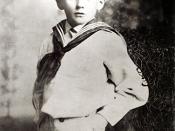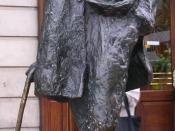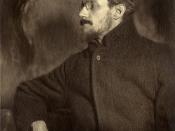� PAGE �2�
Innocence, Ignorance, and Knowledge in "Araby" and "The Boarding House"
�
�
In Dubliners, James Joyce uses innocence and ignorance to question whether realizations of hopelessness are worthwhile. In "Araby" and "The Boarding House," Joyce questions the merit of childish innocence and adult ignorance in the disappointments of love through the comparison of two differently aged characters.
The narrator in "Araby" represents childish innocence, experiencing for the first time the disappointments accompanying love. Joyce uses this character to show the ruination by epiphany of innocence. "Araby's" narrator portrays innocence because he is young and inexperienced. He is not ignoring the hardships of life, but instead does not know any world outside the street games of his neighborhood.
Joyce first demonstrates the narrator's innocence with sight imagery related to his neighborhood. The narrator's blindness to his situation is made evident in the first paragraphs of the story, as the streets are described as "being blind" (19), with the houses personified, "gaz[ing] at one another with brown imperturbable faces" (19).
It is obvious from this that the narrator does not see coming the disappointment of his crush on Mangan's sister.
The hopelessness of the narrator's situation is more evident when he explains that he likes The Memoirs of Vidocq the best of all the books "because its leaves [are] yellow" (19). Although the narrator simply likes the book and sees nothing wrong, those attuned to Joyce's use of yellow and brown as images of stagnation and paralysis realize that the boy will be forever stuck in his current situation, as sad as the yellowed books in the back room.
Not knowing what future awaits him, the narrator seems to want out of his current state of innocence. He refers to "the serious work of life" as "ugly...


